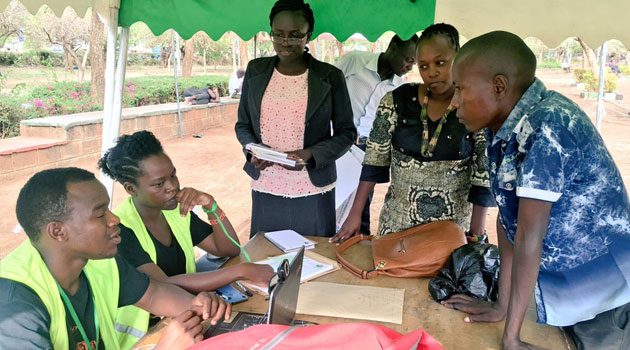
Otieno regretted that nominations had to be carried out so close to key IEBC timelines, a situation that he said has given birth to a myriad of challenges/FILE
NAIROBI, Kenya, May 16 – The Independent Electoral and Boundaries Commission (IEBC) runs the risk of failing to implement orders arising from the Political Parties Disputes Resolution Tribunal owing to strict timelines.
High Court advocate Willis Otieno has said the late conclusion of the disputes could either impede the process of printing ballot papers or result into omission of names as a result of late transmission of rulings to the Commission.
“Based on the timelines we have, some of those disputes may spill over into the High Court and we may end up having a situation where orders are issued so late in the day that ballot papers may not be printed bearing the names that those order will have given,” Otieno said on Tuesday during a forum organised to take stock of the country’s readiness to hold the August elections.
Otieno regretted that nominations had to be carried out so close to key IEBC timelines, a situation that he said has given birth to a myriad of challenges.
He noted that some orders could present hurdles that could lead to nullification of election results in some areas, after the August 8 polls.
“We run a challenge where the Commission may run out of time; courts may make orders which because of the deadlines may not be implemented in time,” the advocate argued.
“People may end up electing people who immediately they are elected you have petitions to remove them because they were elected as a result of a process that ignored a court order,” he added.
Otieno also faulted the position the Commission has taken on the ongoing petition challenging the declaration of final results for the presidential vote at the constituency level, saying the electoral body runs the risk of failing to implement court orders.
He argued that the firm position taken by the IEBC is an indication that the body has already made up its mind on the matter even before the ruling is made.
“I would expect some other person to file the appeal and not the commission. The question is assuming the Court of Appeal upholds the decision by the High Court, will the Commission implement that decision?” he posed.
Otieno argued that the IEBC needed to consult widely with other parties involved in the electoral process to come up with an all-inclusive approach to contentious issues.
“If we start a national conversation on how to address these problems, we can still have credible polls. I believe the commission should start having a more proactive public engagement so that we can be confident to have a level playing field during elections,” he pointed out.
Early in April, a three-judge bench of the High Court ruled that the IEBC could not make any changes on presidential results announced by 290 constituency Returning Officers, quashing the electoral body’s argument that it had to confirm results transmitted from the constituency level.
Justices Aggrey Muchelule, Weldon Korir and Chacha Mwita held that sections 39(2) and (3) of the Elections Act provided for the announcement of presidential results at the constituency level , declaring section 39(2) (3) of the Elections General Regulations Act 2012 unconstitutional as they offend Articles 86, 87 and 138 of the Constitution.
IEBC’s legal counsel however appealed the ruling arguing that the court erred in its findings.
The Court of Appeal will hear the matter on June 6 and 7 before making its ruling either upholding or annulling a ruling made by the High Court.








































